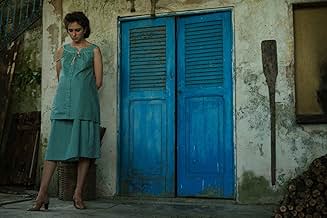La Vie invisible d'Eurídice Gusmão
Titre original : A Vida Invisível
NOTE IMDb
7,7/10
10 k
MA NOTE
Deux soeurs nées à Rio de Janeiro vivent leur vie chacune croyant à tort que l'autre réalise ses rêves à l'autre bout du monde.Deux soeurs nées à Rio de Janeiro vivent leur vie chacune croyant à tort que l'autre réalise ses rêves à l'autre bout du monde.Deux soeurs nées à Rio de Janeiro vivent leur vie chacune croyant à tort que l'autre réalise ses rêves à l'autre bout du monde.
- Réalisation
- Scénario
- Casting principal
- Récompenses
- 38 victoires et 53 nominations au total
Gregório Duvivier
- Antenor
- (as Gregorio Duvivier)
Avis à la une
This film is a piece of art. The acting, the cinematography and the soundtrack are all great. It will make you sad, though. As a woman, it hits me even harder seeing the amount of injustice these sisters went through. One of the merits of this story is that it showed how much women were oppressed in their daily, middle class lives. There's no evil villain here, these girls are victims of their own society, of their own family, of people who don't even realize the extent of the harm they are causing.
I do think it has its flaws, some pacing issues maybe, but overall it's a great movie that actually made me feel the agony, melancholy and frustration of the characters and reflect about how this was (and unfortunately still is) the reality for many women around the world.
I do think it has its flaws, some pacing issues maybe, but overall it's a great movie that actually made me feel the agony, melancholy and frustration of the characters and reflect about how this was (and unfortunately still is) the reality for many women around the world.
The Invisible Life of Euridice Gusmao is a melodrama that gives the audience a look at Brazilian culture during the 1950s and what life was like for most women under the patriarchal society that often made them struggle to succeed. What captured my attention from the outset were the spectacular set design and the period costumes that accurately depict life from that time. The production team, particularly director Karim Aïnouz and producer Rodrigo Teixeira, have my ultimate respect in nailing those aspects so accurately. This film entertained and educated me about that period of time and its culture, which are very unique characteristics I don't often see, but love.
The film is about two inseparable sisters living in Rio de Janeiro during the 1950s, that live under their conservative parents' strict guidance. Even though both sisters are involved in the traditional life that surrounds them, Euridice wants to become a renowned pianist and Guida wants to find true love. When their father separates them and makes them live apart from each other, they work to meet their goals, while hoping that they can reunite one day and celebrate life together, since they are each other's support and joy.
My favorite scene is when Euridice carefully covers for Guida's secret nighttime outings to dance clubs with a Greek sailor. She encourages her sister to not give in to their parents' strict lifestyle and proposes that they should expose themselves to experiences that will fill them with happiness.
The important message that I learned from this film is the importance of how women have fought for their place and equality within a patriarchal society. Before, women were submissive to the patriarch, but as time has passed, society has realized what a huge injustice was being made and corrected the social forms. This movie is very big on showing how times were different back then for women and how thankful we all must be that a turn was made. Young women like Euridice and Guida struggled from an early age to find happiness. I rate this movie 5 out of 5 stars and recommend it for ages 13 to 18, plus adults.
Reviewed by Alejandra G. , KIDS FIRST! Reviewers. For more film reviews by tweens and teens, visit kidsfirst dot org.
The film is about two inseparable sisters living in Rio de Janeiro during the 1950s, that live under their conservative parents' strict guidance. Even though both sisters are involved in the traditional life that surrounds them, Euridice wants to become a renowned pianist and Guida wants to find true love. When their father separates them and makes them live apart from each other, they work to meet their goals, while hoping that they can reunite one day and celebrate life together, since they are each other's support and joy.
My favorite scene is when Euridice carefully covers for Guida's secret nighttime outings to dance clubs with a Greek sailor. She encourages her sister to not give in to their parents' strict lifestyle and proposes that they should expose themselves to experiences that will fill them with happiness.
The important message that I learned from this film is the importance of how women have fought for their place and equality within a patriarchal society. Before, women were submissive to the patriarch, but as time has passed, society has realized what a huge injustice was being made and corrected the social forms. This movie is very big on showing how times were different back then for women and how thankful we all must be that a turn was made. Young women like Euridice and Guida struggled from an early age to find happiness. I rate this movie 5 out of 5 stars and recommend it for ages 13 to 18, plus adults.
Reviewed by Alejandra G. , KIDS FIRST! Reviewers. For more film reviews by tweens and teens, visit kidsfirst dot org.
Greetings again from the darkness. Masterful storytelling when combined with expert filmmaking is a treasure to be appreciated and enjoyed, even if the story is not so pleasant. Such is the case with this gem from writer-director Karim Ainouz, who adapted the screenplay with Murilo Hauser and Ines Bortagaray from the novel "The Invisible Life of Euridice Gusmao" by Martha Bathala. Based in Rio de Janiero, the film blends the vibrant colors of the area with the traditional and restrictive Latin American family expectations of the 1950's.
The story spans 5 or 6 decades, and when we first meet sisters Euridice and Guida, it's clear they share a tight emotional bond that goes deeper than blood. Though their personalities differ greatly, they are both ahead of their time and out of step with the conventions of the era. Euridice (a strong performance by Carol Duarte) longs for independence and aspires to be a concert pianist after a hoped-for Conservatory in Vienna, while Guida (a powerhouse Julia Stockler) is a dreamer seeking true love, and whose party girl ways must be kept hidden from their conservative father. Both young ladies are spirited, yet respectful.
Their lives are forever altered when Guida runs off to Greece with her sailor lover. As is too often the case with young dreamers, she returns home once her spontaneous choices prove to be poor judgment. Her father rejects his pregnant daughter since, in his eyes, she has disgraced the family. The parents mislead Guida about her sister's whereabouts, so Guida assumes Euridice is off at conservatory fulfilling her dreams. This sets Guida off on her own solitary path.
In actuality, Euridice has married and experienced one of the worst ever wedding nights, featuring what is likely cinema's most unsexy bathroom lovemaking scene. There is an element of horror films to this segment of the film, as the sisters are living their worst nightmares, while being separated from each other ... unable to communicate. The male-dominated Latin culture and family traditions prevent their mother from 'disobeying' the father's order, so the cruel lie continues as the sisters unknowingly live their lives within the same town. There is even one excruciatingly painful-to-watch scene that finds them in the same restaurant at the same time, yet oblivious to the presence of the other.
Each woman's inner-strength pushes them forward. Guida (now Gisele) befriends a wise former prostitute Filomena (an excellent Barbara Santos) who becomes her mentor in poverty. Euridice tries to make the best of her situation while keeping her dream alive. Mostly what we have is a tragic story without one specific tragedy - other than the daughter spurned by her father. There are so many moments of pain and frustration, with undelivered mail being among the worst. The film is beautifully shot by cinematographer Helene Louvart, and it reminds us that 'life happens', and it's not all love and Bach. This is an emotional and heart-breaking story, and devotees of The Lifetime Channel will likely be disappointed in the ending. For me, I have no qualms about the emotional wringer the film puts viewers through - even after the opening scene foreshadowing.
The story spans 5 or 6 decades, and when we first meet sisters Euridice and Guida, it's clear they share a tight emotional bond that goes deeper than blood. Though their personalities differ greatly, they are both ahead of their time and out of step with the conventions of the era. Euridice (a strong performance by Carol Duarte) longs for independence and aspires to be a concert pianist after a hoped-for Conservatory in Vienna, while Guida (a powerhouse Julia Stockler) is a dreamer seeking true love, and whose party girl ways must be kept hidden from their conservative father. Both young ladies are spirited, yet respectful.
Their lives are forever altered when Guida runs off to Greece with her sailor lover. As is too often the case with young dreamers, she returns home once her spontaneous choices prove to be poor judgment. Her father rejects his pregnant daughter since, in his eyes, she has disgraced the family. The parents mislead Guida about her sister's whereabouts, so Guida assumes Euridice is off at conservatory fulfilling her dreams. This sets Guida off on her own solitary path.
In actuality, Euridice has married and experienced one of the worst ever wedding nights, featuring what is likely cinema's most unsexy bathroom lovemaking scene. There is an element of horror films to this segment of the film, as the sisters are living their worst nightmares, while being separated from each other ... unable to communicate. The male-dominated Latin culture and family traditions prevent their mother from 'disobeying' the father's order, so the cruel lie continues as the sisters unknowingly live their lives within the same town. There is even one excruciatingly painful-to-watch scene that finds them in the same restaurant at the same time, yet oblivious to the presence of the other.
Each woman's inner-strength pushes them forward. Guida (now Gisele) befriends a wise former prostitute Filomena (an excellent Barbara Santos) who becomes her mentor in poverty. Euridice tries to make the best of her situation while keeping her dream alive. Mostly what we have is a tragic story without one specific tragedy - other than the daughter spurned by her father. There are so many moments of pain and frustration, with undelivered mail being among the worst. The film is beautifully shot by cinematographer Helene Louvart, and it reminds us that 'life happens', and it's not all love and Bach. This is an emotional and heart-breaking story, and devotees of The Lifetime Channel will likely be disappointed in the ending. For me, I have no qualms about the emotional wringer the film puts viewers through - even after the opening scene foreshadowing.
This movie has many good things in it: the sisters are very well cast and the acting in general is inspired.
Locations, costumes and colors are absolutely on point.
I just didn't really enjoy the plot and the script... I understand that this is meant to be a representation of repressive society, but the characters don't act as normal people would and I find it unnerving since this was meant to be a dramatic/realistic movie.
An immersive experience with great acting and a terrific story. One of the best movies of 2019. Highly recommended!
Le saviez-vous
- AnecdotesBrazil's official submission for the 'Best Foreign Language Film' category at the 92nd Academy Awards in 2020. Runner-up was Bacurau (2019).
- ConnexionsFeatured in Conversa com Bial: Épisode datant du 4 juillet 2019 (2019)
Meilleurs choix
Connectez-vous pour évaluer et suivre la liste de favoris afin de recevoir des recommandations personnalisées
- How long is Invisible Life?Alimenté par Alexa
Détails
- Date de sortie
- Pays d’origine
- Sites officiels
- Langues
- Aussi connu sous le nom de
- La Vie invisible d'Euridice Gusmao
- Lieux de tournage
- Pedregulho Housing Complex - Rua Marechal Jardim, São Cristóvão, Rio de Janeiro, Brésil(elder Euridice's apartment)
- Sociétés de production
- Voir plus de crédits d'entreprise sur IMDbPro
Box-office
- Montant brut aux États-Unis et au Canada
- 146 535 $US
- Week-end de sortie aux États-Unis et au Canada
- 8 127 $US
- 22 déc. 2019
- Montant brut mondial
- 1 776 017 $US
- Durée2 heures 19 minutes
- Couleur
- Rapport de forme
- 2.39 : 1
Contribuer à cette page
Suggérer une modification ou ajouter du contenu manquant

Lacune principale
What is the Japanese language plot outline for La Vie invisible d'Eurídice Gusmão (2019)?
Répondre




























